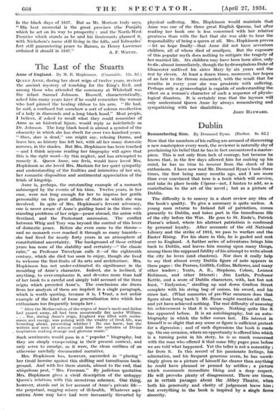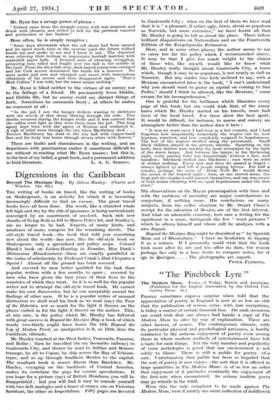Dublin
Remembering Sion. By Desmond Ryan. (Barker. 8s. 6d.) Now that the members of his calling are accused of discovering a new masterpiece every week, the reviewer is naturally shy of proclaiming his belief that he has in fact encountered a master- piece. This is not only from lack of courage, but because he knows that, in the few days allowed him for making up his mind, he has no time to recover from the shock of his enthusiasm. I have now read Mr. Desmond Ryan's book three times, the first being many months ago, and I am more than ever convinced that here is a book which will survive, and take its place beside Ulysses—not, I hasten to add, as a contribution to the art of the novel ; but as a picture of Dublin.
The difficulty is to convey in a short review any idea of the book's quality.. To give a summary is quite useless. A young man returns to Ireland full of patriotism, comes presently to Dublin, and takes part in the tumultuous life of the city before the War. He goes to St. Enda's, Patrick Pearse's school, where his abstract patriotism is confirmed by personal loyalty. After accounts of the old National Library and the strike of 1913, we pass to warfare and the Easter Rising. For his share in this, he is gaoled and sent over to England. A further series of adventures brings him back to Dublin, and leaves him musing upon many things, among them the supposed futility of his attempt to write about the city he loves (and chastens). Nor does it really help to say that almost every Dublin figure of note appears in these pages : the Pearses, Griffith, Collins, Mellowes, and many other leaders ; Yeats, A. E., Stephens, Colum, Lennox Robinson, and other litterati ; Jim Larkin, Professor Kettle, and a score of Dublin characters, with, last but not least, " Endymion," strolling up and down Grafton Street complete with his string bag of onions, his sword, and his straw hat. (What memories of pre-War summers does that figure alone bring back !) Mr. Ryan might mention all these, and yet have achieved nothing. The real difficulty of assessing his achievement is that it is unique.. Nothing quite like it has appeared before. It is an autobiography, but an auto- biography in which the teller comes last. His interest in himself is so slight that any. scene or figure is sufficient pretext for a digression ; and of such digressions the book is made up. On one occasion, where an opportunity is offered him which is a turning point in his story, he is so much concerned with the man who offered it that some fifty pages pass before we are told what happened. Yet the teller is not a nonentity ; far from it. In this record of his passionate feelings, his admiration, and his frequent generous scorn, he has unwit- tingly given us a picture of himself far clearer than anything he could have planned or penned by artifice ; a picture which commands immediate liking and a deep respect. He will provoke plenty of disagreement. There are times, as in certain passages about the Abbey Theatre, when both his generosity and clarity of judgement leave him-; but everything in the book is inspired by a single fierce sincerity.
Mr. Ryan has a savage power of phrase : " Ireland came from the struggle rotten with war neurosis and drunk with phrases, and reeled to hell for the personal vanities and pettinesses of her leaders."
More often, he is simply receptive : " Some days afterwards when the cell doors had been opened and we spent much time in the exercise yard the future walked beside me and spoke to me and I knew it not. The deported were relieving their feelings in impromptu football matches with makeshift paper balls. A frenzied mass of swearing, struggling, perspiring men rolled and fought over the ball in the middle of the yard. From the din a tall, wiry, dark-haired young man emerged and his Cork accent dominated the battle for a moment. He went under and rose and whooped and swore with tremendous vibrations of his accent and then "disappeared again. ' That's Mick Collins,' I was told, but the name meant nothing."
Mr. Ryan is blind neither to the virtues of an enemy nor to the failings of a friend. He passionately loves Dublin, and Dublin life, but no enemy could say sharper things of both. Sometimes he comments freely ; at others he makes no comment at all :
" In the jail I saw the hunger strikers wasting to skeletons with the stench of slow decay blowing through the cells. Two deaths occurred during the hunger strike and it was noticed that the coffins were light as they were borne from the jail. This long agony kept time with the agony of Brixton and outlasted it. A sigh of relief went through the city when MacSwiney died . . Terence MacSwiney lay dead in the city hall with copper-hued face and his body was borne through streets white with flowers."
• There are faults and clumsinesses in the writing, and an impatience with punctuation makes it sometimes difficult to see -without re-reading what Mr. Ryan means ; but this is,- to the best of my belief, a great book, and a permanent addition













































 Previous page
Previous page